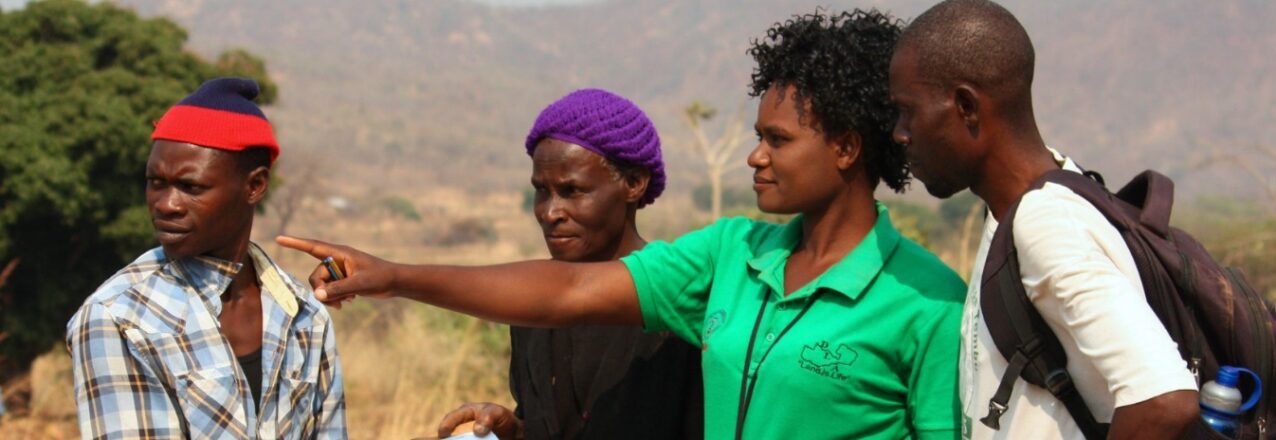USAID is securing and strengthening women’s land rights across the developing world. Owning land is central to determining household income and opportunity and can provide a powerful pathway to improved wellbeing, livelihoods, and self-reliance. Although women play a critical role in food production, they are less likely than men to own and control land. Forty percent of the world’s economies limit women’s property rights, and 44 of 191 countries do not provide female and male surviving spouses with equal rights to inherit assets.
According to a 2020 global survey, one in five women feels insecure about her land and property rights, and in some regions like Sub-Saharan Africa nearly one in every two women fears losing her land in the event of divorce or death of spouse.
WHY WOMEN’S LAND RIGHTS MATTER
Ownership and control over assets that support income lie at the very heart of women’s economic empowerment and their ability to contribute to local, national, and global economies. For most women, the most valuable of these assets are the land and natural resources from which they earn a living, provide for their families, and invest in their communities. Evidence suggests that increasing women’s access to land and natural resources, and participation in agricultural value chains can have a positive impact on women’s agency, household productivity and income, responsible spending, and food security1. According to the Food and Agriculture Organization of the United Nations, if women had the same access to productive resources as men, farm output would increase by 20 to 30 percent.
USAID’s Integrated Land and Resource Governance (ILRG) project and Land Evidence for Economic Rights, Gender and Empowerment (LEVERAGE) activity under the Communications, Evidence and Learning (CEL) project are strengthening women’s land rights and economic empowerment in countries in sub-Saharan Africa and Southern Asia. Improving women’s land rights is key to addressing barriers that restrict women’s ability to reach their full economic potential, while also contributing towards increasing women’s participation in the workforce and supporting to women’s entrepreneurship.
ACTIVITIES ON WOMEN’S LAND RIGHTS AND WOMEN’S ECONOMIC EMPOWERMENT
USAID’s goal is to improve women’s access to and control of land and natural resources for concrete economic, social, and political opportunities. Working with women, governments, traditional leaders, communities, and the private sector, USAID uses the following strategies:
SUPPORTING LAW AND POLICY REFORMS. Reforming legal frameworks to establish women’s rights to land and natural resources is one of the most effective ways to empower women at scale. USAID is working with governments and customary leaders at the national and local levels to adopt and implement laws and policies that promote women’s land rights. USAID is also raising awareness and providing legal literacy and access to justice for women, so they are able to access and benefit from existing rights.
GENDER INTEGRATION IN LAND DOCUMENTATION. USAID is promoting gender integration in systematic land documentation processes led by governments, civil society, or private sector actors, ensuring that women’s land rights are considered in all steps, from planning to final documentation of individual or community land. Awareness-raising and communications activities are encouraging women to register their rights. Gender integration tools and best practices will be shared with governments, international organizations, NGOs, and other donors for broader application in ongoing and future land documentation efforts.
GENDER AND SOCIAL NORMS CHANGE. USAID is providing training and promoting dialogues on harmful gender and social norms for customary leaders and communities to promote changes in gender bias that hinders women from gaining rights and control over land and natural resources. USAID is also promoting gender norms change within households to enhance women’s participation in decision-making, promote collaboration within families, and mitigate gender-based violence.
AGENCY-BASED EMPOWERMENT FOR WOMEN. USAID is providing women with the skills, knowledge, and resources to meaningfully participate in decision-making and governance related to land and natural resources and to engage in agricultural value chains. Increased agency enables women to leverage secure land rights to access financing, agricultural extension, and employment in the wildlife and forestry sectors.
PRIVATE SECTOR ENGAGEMENT. Partnerships with national and multinational companies are developing policies for gender-responsive land-based investment and business practices that reach, benefit, and empower women in different agricultural value chains. USAID is contributing to the growing evidence base on the business case for women’s economic empowerment. Including women in value chains has positive impacts not only for women, their families, and communities, but also on key business performance indicators like agricultural yield, productivity, and quality of production.
GATHERING AND DISSEMINATING EVIDENCE, BEST PRACTICES, AND LESSONS LEARNED. Extensive impact and performance evaluations of past and ongoing projects will produce a rich body of evidence to inform governments, donors, and other stakeholders in developing new policies and programs to effectively strengthen women’s rights and translate them into sustainable social and economic empowerment.


